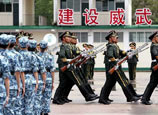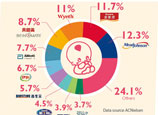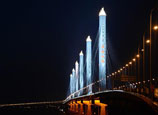
CHANGCHUN, July 18 (Xinhua) -- Chinese automakers have demonstrated their ambitions to tap into overseas markets at an ongoing auto show in northeast China.
A large number of automakers, from privately-owned firms to state-owned enterprises, have been making greater efforts to sell their vehicles outside of China, where sales growth has slowed after a decade-long boom.
Geely Motor, a privately-owned automaker that purchased Volvo Car Corp. in 2010, exported 50,438 vehicles in the first half of the year, up 30 percent year on year.
Sales in overseas markets account for about one-fifth of the company's total sales, according to Zhang Lin, vice president of Geely Motor.
"Chinese automakers must prepare themselves properly to compete with their foreign peers if they intend to go international. This might take three to five years or longer," Zhang said at the Changchun International Automobile Exhibition, which opened on Friday in northeast China's Jilin Province.
Zhang said Geely's earlier efforts to foster overseas sales have matured and the company's international business is on the right track.
Apart from the opening of an assembly plant and the launch of its EC7 sedan in Egypt last year, Geely has completed another project in Uruguay, where the EC7 sedan, a medium- to high-end luxury vehicle launched in 2009, will be put into production with an annual single-shift capacity of about 10,000 units, according to Zhang.
According to a plan previously announced by the company, Geely will expand its overseas production to countries like Russia, Brazil, India and Iran.
Like Geely, other privately-owned automakers such as Great Wall Motor, Chery Auto and BYD have set foot in emerging markets by building assembly plants.
Great Wall Motor's plant in Lipetsk of Russia will go operational within the year. The company also plans to build a plant in Ussuriysk.
State-owned automakers have also joined in with ambitious expansion plans.
Beijing Automobile Industry Corp. (BAIC) announced its international strategy in June, vowing to bring its annual overseas sales to 400,000 units by 2020, of which 70 percent will be manufactured outside China.
Foton Motor, a commercial vehicle branch of BAIC, recently announced a 670 million yuan (106 million U.S. dollars) investment plan that will result in the construction of a plant in Brazil.
However, China has witnessed a retreat in its automobile exports after years of brisk growth.
Figures from the China Association of Automobile Manufacturers (CAAM) show that China exported 486,800 vehicles in the first six months of the year, down 0.6 percent from the same period last year.
Dong Yang, executive vice president of CAAM, said it is too early to comment on the export slide.
Industry watchers have been questioning the export structure for Chinese automakers, noting that most vehicles go to markets in Africa, Asia and Latin America.
Zhang said emerging markets were prioritized in the industry's initial stages of growth. "But we do have plans to enter the European and American markets gradually," he said.
Zhang said expertise built up in emerging markets will help Chinese automakers gain a foothold in more developed areas.
"Chinese automakers will definitely enter the European and American markets. It is simply a question of time," Zhang said.


















![]()
